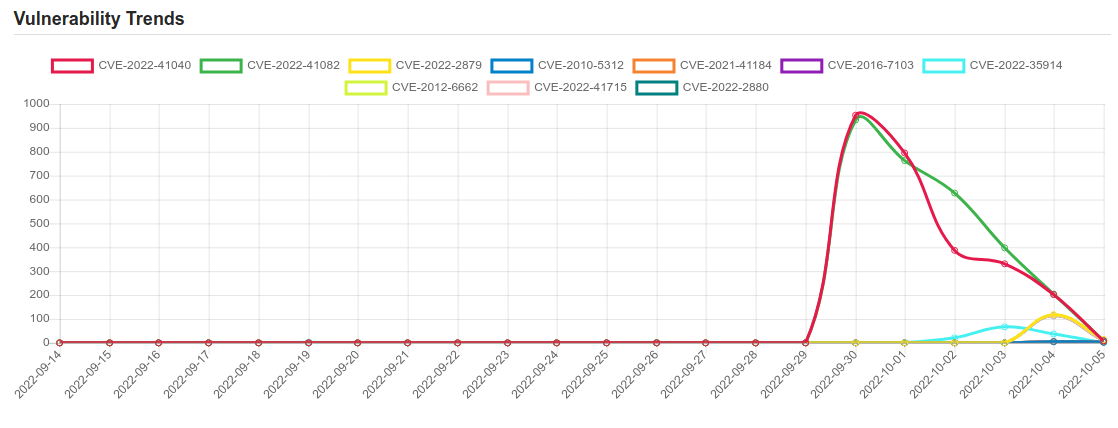Daily Vulnerability Trends: Thu Oct 06 2022

| CVE NAME | CVE Description |
| CVE-2022-2880 | No description provided |
| CVE-2022-41850 | No description provided |
| CVE-2022-40140 | An origin validation error vulnerability in Trend Micro Apex One and Apex One as a Service could allow a local attacker to cause a denial-of-service on affected installations. Please note: an attacker must first obtain the ability to execute low-privileged code on the target system in order to exploit this vulnerability. |
| CVE-2021-44228 | Apache Log4j2 2.0-beta9 through 2.15.0 (excluding security releases 2.12.2, 2.12.3, and 2.3.1) JNDI features used in configuration, log messages, and parameters do not protect against attacker controlled LDAP and other JNDI related endpoints. An attacker who can control log messages or log message parameters can execute arbitrary code loaded from LDAP servers when message lookup substitution is enabled. From log4j 2.15.0, this behavior has been disabled by default. From version 2.16.0 (along with 2.12.2, 2.12.3, and 2.3.1), this functionality has been completely removed. Note that this vulnerability is specific to log4j-core and does not affect log4net, log4cxx, or other Apache Logging Services projects. |
| CVE-2020-14882 | Vulnerability in the Oracle WebLogic Server product of Oracle Fusion Middleware (component: Console). Supported versions that are affected are 10.3.6.0.0, 12.1.3.0.0, 12.2.1.3.0, 12.2.1.4.0 and 14.1.1.0.0. Easily exploitable vulnerability allows unauthenticated attacker with network access via HTTP to compromise Oracle WebLogic Server. Successful attacks of this vulnerability can result in takeover of Oracle WebLogic Server. CVSS 3.1 Base Score 9.8 (Confidentiality, Integrity and Availability impacts). CVSS Vector: (CVSS:3.1/AV:N/AC:L/PR:N/UI:N/S:U/C:H/I:H/A:H). |
| CVE-2021-2109 | Vulnerability in the Oracle WebLogic Server product of Oracle Fusion Middleware (component: Console). Supported versions that are affected are 10.3.6.0.0, 12.1.3.0.0, 12.2.1.3.0, 12.2.1.4.0 and 14.1.1.0.0. Easily exploitable vulnerability allows high privileged attacker with network access via HTTP to compromise Oracle WebLogic Server. Successful attacks of this vulnerability can result in takeover of Oracle WebLogic Server. CVSS 3.1 Base Score 7.2 (Confidentiality, Integrity and Availability impacts). CVSS Vector: (CVSS:3.1/AV:N/AC:L/PR:H/UI:N/S:U/C:H/I:H/A:H). |
| CVE-2022-24828 | Composer is a dependency manager for the PHP programming language. Integrators using Composer code to call `VcsDriver::getFileContent` can have a code injection vulnerability if the user can control the `$file` or `$identifier` argument. This leads to a vulnerability on packagist.org for example where the composer.json’s `readme` field can be used as a vector for injecting parameters into hg/Mercurial via the `$file` argument, or git via the `$identifier` argument if you allow arbitrary data there (Packagist does not, but maybe other integrators do). Composer itself should not be affected by the vulnerability as it does not call `getFileContent` with arbitrary data into `$file`/`$identifier`. To the best of our knowledge this was not abused, and the vulnerability has been patched on packagist.org and Private Packagist within a day of the vulnerability report. |
| CVE-2022-35256 | No description provided |
| CVE-2022-39197 | An XSS (Cross Site Scripting) vulnerability was found in HelpSystems Cobalt Strike through 4.7 that allowed a remote attacker to execute HTML on the Cobalt Strike teamserver. To exploit the vulnerability, one must first inspect a Cobalt Strike payload, and then modify the username field in the payload (or create a new payload with the extracted information and then modify that username field to be malformed). |
| CVE-2019-5418 | There is a File Content Disclosure vulnerability in Action View <5.2.2.1, <5.1.6.2, <5.0.7.2, <4.2.11.1 and v3 where specially crafted accept headers can cause contents of arbitrary files on the target system's filesystem to be exposed. |
| CVE-2022-22616 | This issue was addressed with improved checks. This issue is fixed in Security Update 2022-003 Catalina, macOS Monterey 12.3, macOS Big Sur 11.6.5. A maliciously crafted ZIP archive may bypass Gatekeeper checks. |
| CVE-2022-41040 | No description provided |
| CVE-2022-41082 | No description provided |
| CVE-2022-2879 | No description provided |
| CVE-2010-5312 | Cross-site scripting (XSS) vulnerability in jquery.ui.dialog.js in the Dialog widget in jQuery UI before 1.10.0 allows remote attackers to inject arbitrary web script or HTML via the title option. |
| CVE-2021-41184 | jQuery-UI is the official jQuery user interface library. Prior to version 1.13.0, accepting the value of the `of` option of the `.position()` util from untrusted sources may execute untrusted code. The issue is fixed in jQuery UI 1.13.0. Any string value passed to the `of` option is now treated as a CSS selector. A workaround is to not accept the value of the `of` option from untrusted sources. |
| CVE-2016-7103 | Cross-site scripting (XSS) vulnerability in jQuery UI before 1.12.0 might allow remote attackers to inject arbitrary web script or HTML via the closeText parameter of the dialog function. |
| CVE-2022-35914 | /vendor/htmlawed/htmlawed/htmLawedTest.php in the htmlawed module for GLPI through 10.0.2 allows PHP code injection. |
| CVE-2012-6662 | Cross-site scripting (XSS) vulnerability in the default content option in jquery.ui.tooltip.js in the Tooltip widget in jQuery UI before 1.10.0 allows remote attackers to inject arbitrary web script or HTML via the title attribute, which is not properly handled in the autocomplete combo box demo. |
| CVE-2022-41715 | No description provided |
A considerable amount of time and effort goes into maintaining this website, creating backend automation and creating new features and content for you to make actionable intelligence decisions. Everyone that supports the site helps enable new functionality.
If you like the site, please support us on Patreon using the button below

To keep up to date follow us on the below channels.




![[NIGHTSPIRE] - Ransomware Victim: Wilmington Personal Injury Lawyer - DPLAW 6 image](https://www.redpacketsecurity.com/wp-content/uploads/2024/09/image-300x300.png)
